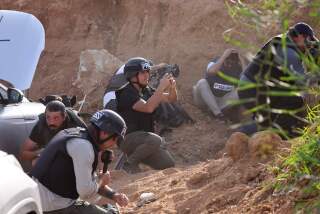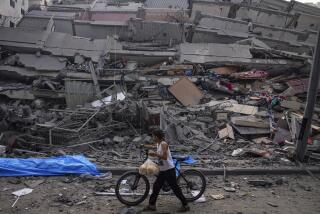Bombs Fuel Wrath of Revenge-Hungry Serbs
- Share via
PRISTINA, Yugoslavia — Rumbling through Pristina’s streets in armored personnel carriers, the Interior Ministry police wear blue-and-black camouflage fatigues and black knit caps that pull down to become masks.
Some of the vehicles are mounted with antiaircraft guns, but even in Kosovo, ground-to-air combat is not normally a police matter. The shock troops’ job, apparently, is to terrify, and they are doing it well in Pristina.
The police units that ethnic Albanian villagers charge specialize in brutalizing Kosovo’s rural civilians have now arrived in this capital of the Serbian province.
And after Serbia’s government ordered the expulsion of Western journalists Thursday afternoon, there are few independent witnesses left in Kosovo to see any acts of police revenge for the NATO bombardment that began Wednesday.
The North Atlantic Treaty Organization’s airstrikes have infuriated Serbs in Kosovo, where they are fighting to maintain their iron grip on a province that is 90% ethnic Albanian.
Even as explosions from NATO’s cruise missiles and bombs lighted up the horizon on the first night of attacks Wednesday, Serbian police and civilians roamed the blacked-out capital venting their anger.
They included in their fury the office of Ibrahim Rugova, who led Kosovo’s ethnic Albanians through years of passive resistance--which only brought on more repression, which ethnic Albanians answered with a guerrilla insurgency.
Rugova’s office was trashed and burned Wednesday night, and police began rounding up local human rights activists who document the killings, massacres and disappearances of Kosovo’s “dirty war.”
Part of the northern Kosovo town of Podujevo was also reported to be on fire Thursday as Serbian security forces tightened their noose around one of the strongholds of the ethnic Albanians’ guerrilla Kosovo Liberation Army.
Hours after the first bombs and missiles fell, Serbian police invaded Pristina’s Grand Hotel and went from floor to floor in the darkness, pounding on journalists’ doors with the butts of their AK-47s.
Police fired at least one shot inside the hotel itself and ordered several journalists out of their rooms at gunpoint, accusing them of using light beams and portable satellite phones to help guide NATO bombs to their targets.
Serbian authorities had pulled the plug on the capital’s power soon after the NATO air assault began Wednesday, and the flickerings that police saw in the windows of the Grand Hotel were flashlights, candles and TV camera spotlights.
At least one journalist, a correspondent for the BBC, was ordered out of her room and threatened with expulsion in the middle of the night while the airstrikes were still underway.
The police relented and told her to get out of the country Thursday, along with several other journalists rounded up Wednesday night. After sunrise, Serbian officials staked out the Grand Hotel’s lobby with a faxed blacklist, looking for more members of the media to kick out.
A young woman reporter had her visa canceled on the spot, then had her armor-plated vehicle stolen at gunpoint by police as she tried to drive away from the hotel.
The whole press corps of about 30 in Kosovo got an audience with the top Serbian official in the province, Zoran Andjelkovic, on Thursday.
After a long night of bombing, his temper was on a short fuse and he had little sympathy for journalists who asked for his assurance that they could work without fearing the police in Serbia, the dominant of the two republics left in Yugoslavia.
“Since some journalists are willing to leave, I wish you good luck and a nice journey,” Andjelkovic replied. “As for the ones staying, I believe their behavior must be in accordance with the situation.
“Also, if NATO thinks they can establish peace with rockets, the rockets will continue. Those willing to support the peace in Kosovo, I wish you luck.”
By midafternoon, the Serbian government had left Western reporters, photographers and TV crews with no choice at all by ordering them out of the country en masse.
A statement faxed to Associated Press by the Serbian government said: “Journalists of foreign public media from the countries that took part or allowed their territories to be used in NATO aggression on our country will be expelled.”
The order was issued “because they, by their reporting from the territory of the Republic of Serbia, strengthened the aggressive acts of NATO forces aimed at violent destruction of . . . the territorial integrity of Serbia and Yugoslavia,” the statement said.
“This order is effective immediately,” said the declaration, which accused the foreign media of disinformation. It was signed by Serbian Information Minister Aleksandar Vucic.
The exodus from Pristina and also Belgrade, the Serbian and Yugoslav capital, began Thursday afternoon.
Until midafternoon, almost all U.S. journalists in Belgrade had been planning to stay indefinitely, despite the ominous appearance at the Hyatt Hotel that morning of Zeljko “Arkan” Raznjatovic, the most notorious warlord of the conflict earlier this decade in neighboring Bosnia-Herzegovina. Arkan strutted through the lobby of the hotel, where most foreign correspondents were staying, and told hotel staff that he was “in a very bad mood.”
His presence alone--given the record of death squads under his command--was a clear form of intimidation, but his comments added to the effect. Several journalists at the hotel had in recent years conducted interviews with Arkan in which he bragged about how much he enjoyed killing people.
At an early afternoon news conference, Yugoslav Deputy Prime Minister Vuk Draskovic, a former opposition figure seen as relatively moderate but lacking significant power, told foreign correspondents: “You are not our enemies. You are very welcome. We need you.”
Even as he spoke, an expulsion order was being prepared at the office of hard-liner Vucic, who is a key member of the Serbian Radical Party, which plays a central role in Yugoslavia’s power structure.
After the announcement of the expulsion order, correspondents tried to sort out the situation with calls to Draskovic’s office and the Foreign Ministry, but neither could offer any assurances that the expulsion order was not valid or that reporters would be safe overnight.
A parallel intimidation was occurring in Pristina. A CNN crew was packing its equipment and luggage into an armored vehicle in front of the Grand when an angry Serb set fire to some of it. The police called a fire truck and looked very amused.
While that fire was being put out, two Interior Ministry police officers in full combat gear ordered a pair of journalists to lean against their car to be frisked. The police then stole their cellular phones.
A third journalist who asked if his colleagues needed help was ordered to lean, spread eagle, against his car too. After taking his shortwave radio and pocket tape recorder, the police then drove off in his car.
Andjelkovic, the Serbian provincial leader, finally relented and granted a police escort for a convoy of expelled journalists heading south to Yugoslavia’s border with Macedonia.
It pulled out of Pristina just as an armored column passed through the city, getting in place for the second night of airstrikes.
*
Times staff writer David Holley in Belgrade contributed to this report.
More to Read
Sign up for Essential California
The most important California stories and recommendations in your inbox every morning.
You may occasionally receive promotional content from the Los Angeles Times.













